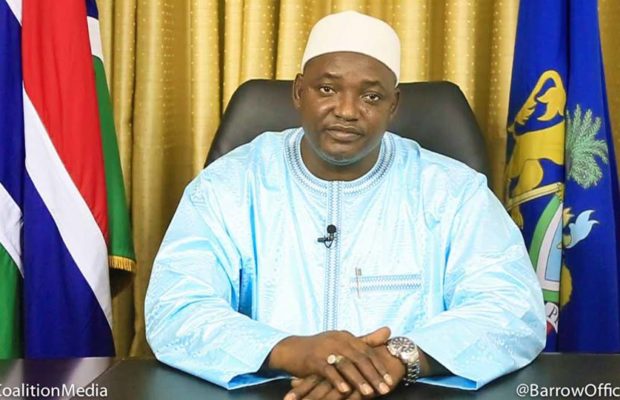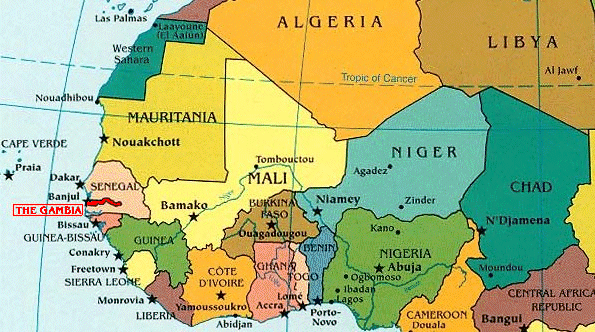The big news of this article is NOT what its heading suggests. I have no doubt, president Barrow is speaking the truth. However, the real meaning of this article – and that’s why I include it here – is that it underscores one of my firm beliefs: “Ritual killings are a – daily – reality in many African countries”. If ritual killings would never occur in the Gambia, this rumor would not have existed. The fact alone that the president of the Gambia finds it necessary to publicly deny any involvement in the ritual killing of his son, says a lot about what’s in peoples’ mind in the Gambia. Also, apparently, the (supposed) link between presidential elections and ritual killing is a logical one, also in the Gambia.
Ritualistic killings, superstition and rumors thrive where there is lack of education and proper information. Hence the key to a better future lies in a better education, accessible to all.
President Barrow denies killing his son for ritual purposes to become president

Adama Barrow won the 2016 presidential election, defeating eccentric dictator Yahya Jammeh (1994 – 2017). Jammeh refused to recognize his defeat and Barrow fled to Senegal. After a diplomatic ECOWAS intervention Jammeh was forced to go into exile. Barrow returned to the Gambia on January 26, 2017 and was installed as Gambia’s third president since independence in 1965.
Published: June 27, 2018
By Pa Nderry M’Bai
Freedom Newspaper
President Adama Barrow has denied reports attributed to him that he allegedly killed his son for ritual purposes so that he can be elected into office as Gambia’s President. The president made the denial through his Press Director Amie Bojang Sissoho, who addressed a news conference on Wednesday at the President’s office in Banjul. This followed, a statement made by President Barrow, during a recent visit to Faraba Banta, where he was quoted as having said that he (Barrow) had to sacrifice his own son, wealth, and life in order for The Gambia to be freed from Jammeh’s twenty-two years dictatorship. Barrow was in Faraba last week to sympathize with the bereaved families, whose loved ones were killed by Gambia’s police intervention unit— the (PIU).
“ When he lost his son, is because he left the Gambia, as president elect. When his son died, he had to leave the children behind. If he was not the president, he would not have done that at that point in time; he wouldn’t have left his family behind. That is what he was trying to explain; that even he has lost his family, but he had to move on because he has taken a responsibility of serving the country,” State House Press Director Amie Bojang Sissoho clarified.
Mr. Barrow’s statement attracted a huge reaction on social media. Many Gambians were taken aback by Barrow’s statement, in which he allegedly made the appearance that he sacrificed his son for ritual purposes to become the country’s President. But the State House was quick to dismiss such reports saying that the President’s statement was being blown out of proportion. It also says Barrow’s statement was being interpreted out of context.
“We have to understand things into context. And remember that when people are in a difficult situation; we have to understand how, and what was the context in which things happened. And this was what simply he was trying to explain. And that is simply what he was trying to explain. That in a process, anything could happen. This is what happened; these lives were loss because of a cause; to show that even he himself lost his child because of a cause. His child died,” Mrs. Bojang Sissoho further clarified.
Mr. Barrow’s son was bitten by a stray dog, and he died in the process. Barrow and his two wives were in Dakar, Senegal, at the time of the incident. His son was buried in his absence.
Mr. Barrow left the Gambia for Mali, to attend a regional Summit over Gambia’s political impasse. He later resettled in Dakar, Senegal, in the wake of the country’s month long political impasse. Former Gambian dictator Yahya Jammeh had refused to concede defeat during Gambia’s December 2016 Presidential elections, which had thrown the impoverished West African country into a state of turmoil.
“And it was difficult time. We all know that..; when his son died, he was president elect; he was not sworn in; he left the country, but that did not stop him to move on. It is not that he did not feel it; what he was trying to say is that we have our difficult times, but we have to move on as a country,” Mrs Bojang Sissoho told journalists.
“I think people have to calm down on receiving information. What the president was emphasizing was that; we all have lost somebody for the sake of the Gambia; We have been either directly or indirectly affected,” she added.
Source: Freedom Newspaper, June 27, 2018

